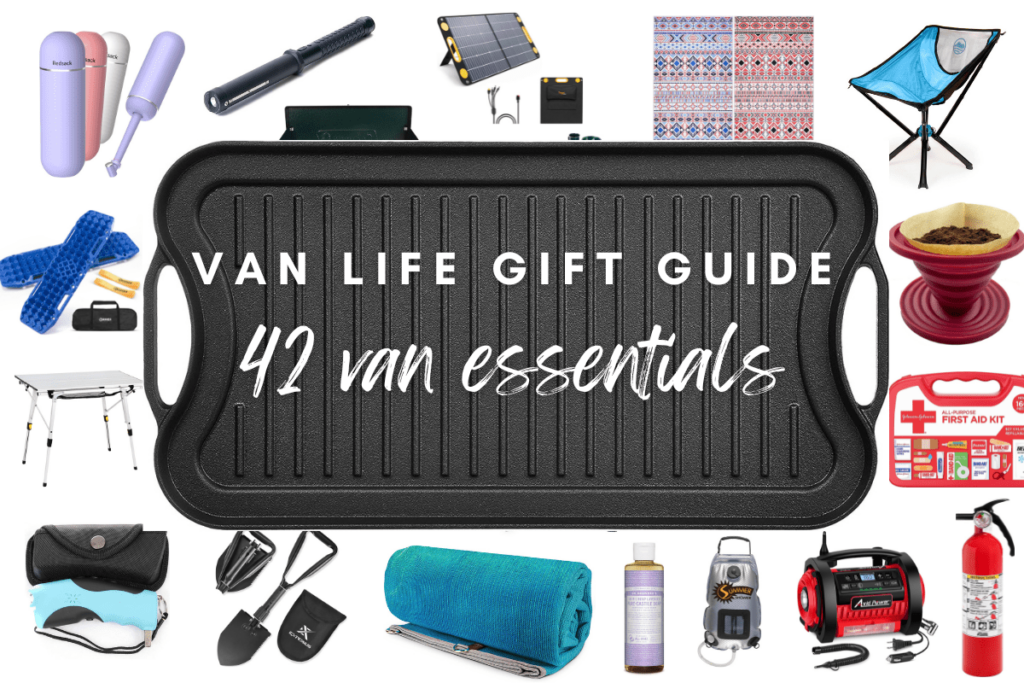So you’ve never experienced winter van life or winter van camping. Ah, you sweet summer child! Winter vanlife is a very different beast than its summertime cousin. From cold and damp to icy road conditions and snow-ins, vanlife in the winter brings a whole suite of unique problems that summertime campers simply don’t have to face.
That being said, there are many things that make wintertime van travel an absolute joy: less crowded destinations, spectacular snow-covered vistas, toasty evenings spent sipping tea and hot cocoa, and epic skiing/snowboarding or winter work (if that’s what you’re into.)
Living in a van during winter is challenging, but rewarding, and with a few choice tips and tricks, there’s no reason you can’t make it work for you.
Can You Live in a Campervan in Winter?
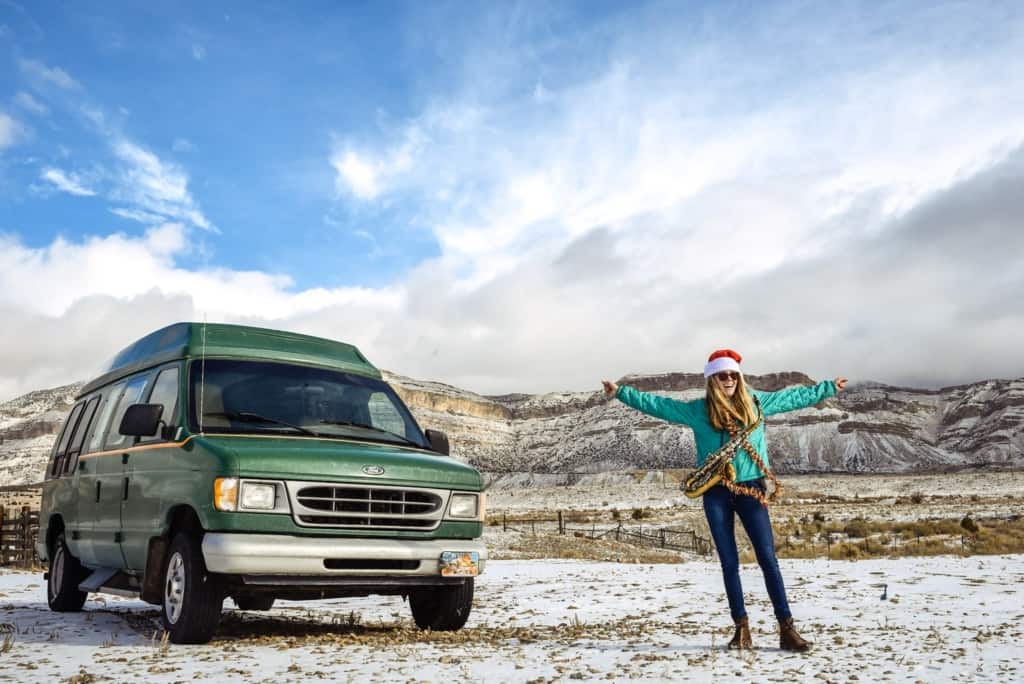
In a word: yes. It’s absolutely possible to live year-round in your van, even in cold climates. It just takes a little more planning and legwork than it does to live year-round in summer climates.
You’ll need a well-insulated van that can handle tough driving conditions. You’ll need to invest in some basic safety equipment like tire chains. You may want to buy a small portable heater, or have a dry heater installed in your van.
Finally, you will need to mentally prepare yourself for the challenges you’ll face while camping in winter: things like frozen water, damp gear, mold and mildew, showering, seasonal campsite closures, and (obviously) the cold.
Driving & Safety Tips
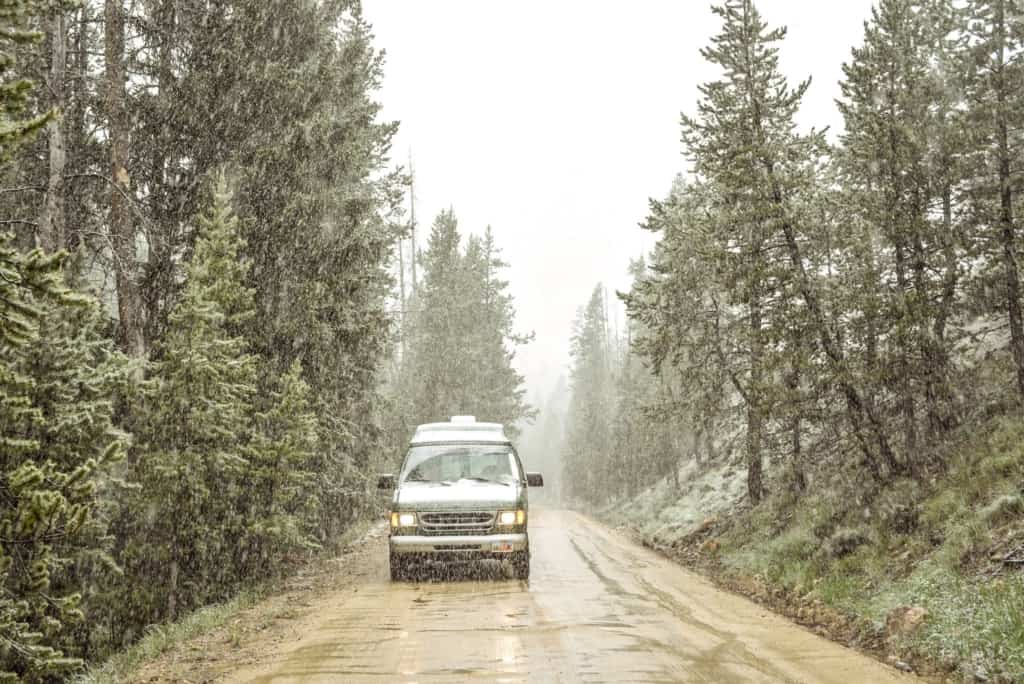
Get the Right Van
Not all vans are built for winter driving. You can’t just take your mom’s minivan out into the wilds and expect it to perform well. When choosing a van for winter vanlife, pay attention to things like four-wheel drive, traction control, and limited slip differential systems.
Check out my roundup of top 4×4 campervans on the market.
These upgrades are all optional, and all will cost you (four-wheel drive alone can be up to $15k on top of the price of the van.) However, for serious, long-term winter driving (especially if you plan to go off road) they are highly recommended.
Carry Basic Safety Equipment
Two words: winter tires! At the very least, you will need winter tires and tire chains. You may also want to carry things like a shovel and rock salt, traction boards to help you get unstuck from snow drifts, and a portable battery jumper.
Drive Slowly
Drive more slowly than you think you need to. All. The. Time. Resist the urge to cut in front of people and accelerate to make sudden lane changes. Don’t tailgate, and don’t let other people tailgate you—pull over if necessary to let them pass.
Check the Forecast
Remember, if it’s raining or cloudy in the valley, it’s probably snowing in the mountains. If you are driving up any scenic byways or mountain passes, you need to make sure the weather forecast is clear in that area.
I’ve experienced many drives that start out sunny–only to find myself stuck on a snowy mountain pass after climbing up in elevation. I once had to spend the night in -7F degrees at the top of a Utah mountain pass, thanks to a snowstorm I didn’t prepare for!
Tips for Staying Warm
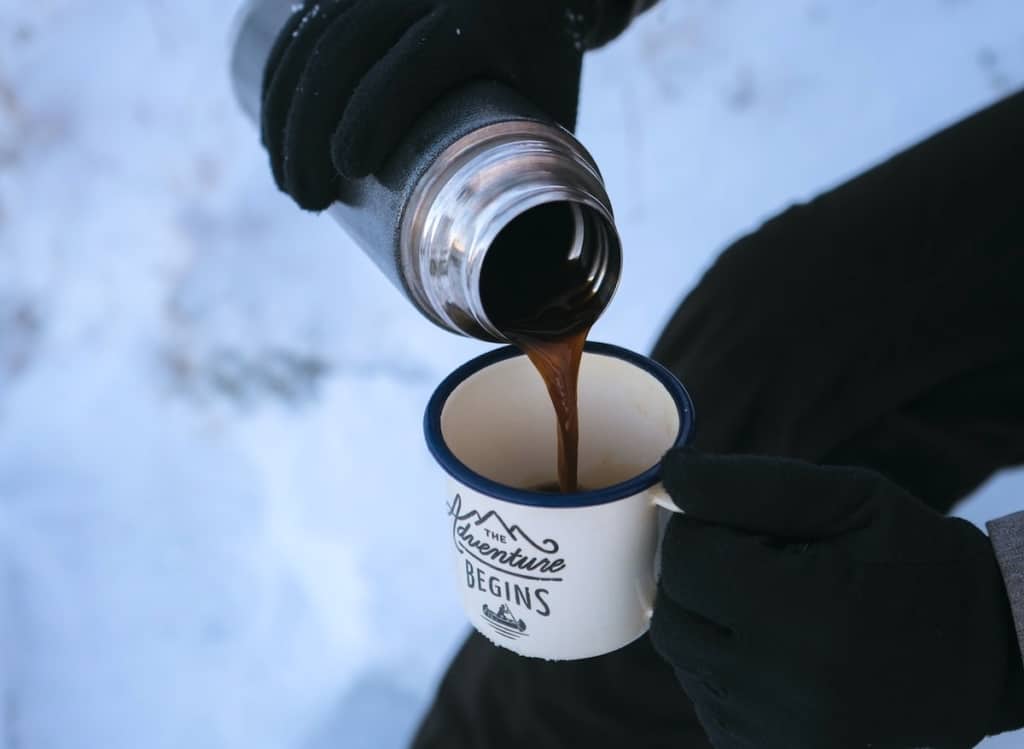
Keep Your Top & Toes Warm
You lose a lot of heat through your head, and, let’s face it, no one’s happy when they have cold feet. You’ll be surprised how much more heat you retain simply by putting on a warm hat and socks.
When the temperature drops, sleeping in a Selk’bag with a hat and socks on will do wonders to keep your core temperature up. And the best part is that it’s a sleeping bag suit, so you don’t have to crawl out of it in the chilly morning! I’ve worn mine to van life events, around campfires, and even while driving.
Blankets!
Investing in a good heated blanket will pay dividends—just make sure you follow directions and don’t leave it plugged in or turned on for too long. If heated blankets aren’t your thing, a good warm travel blanket or two piled on top of you will usually do the trick.
Get a Dry Heat Source
A dry heat source is a heater that doesn’t add any additional moisture to the air, so the humidity level doesn’t rise inside the van. It’s a great way to avoid condensation in the van while staying warm. They are also safe because they do not release carbon monoxide.
There are lots of portable heating options for winter vanlife. Two of the more popular options are Webasto and Espar. You don’t need to leave the heater running all the time: put it on a time so that it shuts off for a few hours overnight or when you’re not in the van to prevent burnout.
Power & Electric Tips
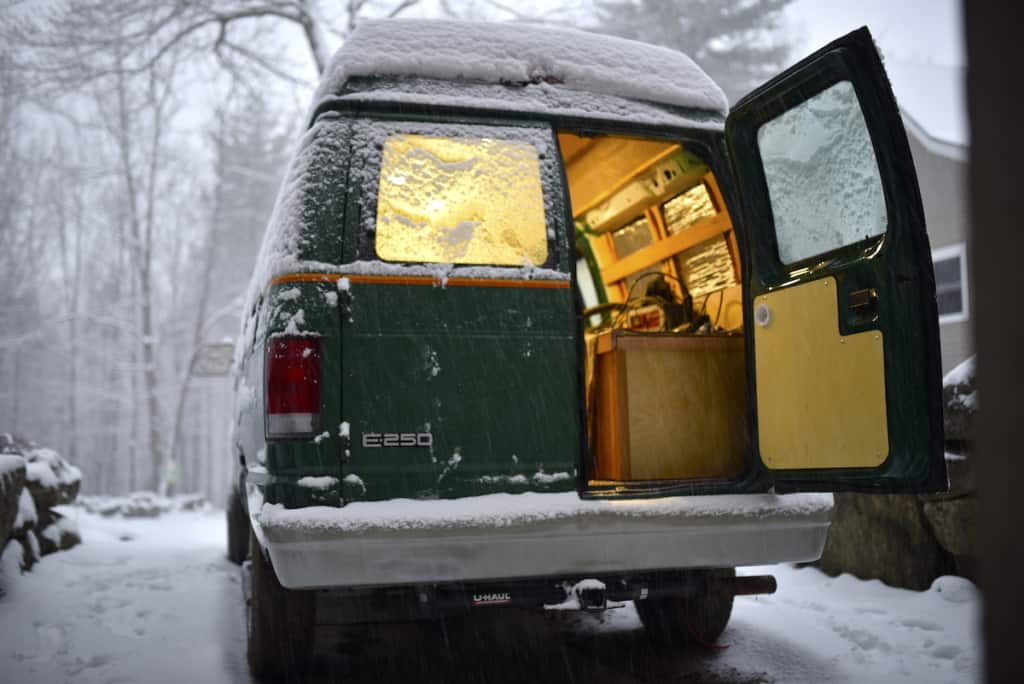
Recharge Whenever You Can
Days are shorter and the sun is lower in the sky. Your solar panels are simply not going to charge as efficiently in the winter. For this reason, it’s important that you recharge them as frequently as possible. When the opportunity to recharge presents itself, don’t pass it up.
In the winter, you’re going to need to rely pretty heavily on your alternator to charge the batteries. Make sure your alternator is in good shape and keep up with regular maintenance.
I use the small, portable Jackery 240 battery and portable solar panels for a power source in the van. They are convenient in low-light situations because I can easily reposition the portable solar panels throughout the day, to capture as much sunlight as possible.
Be Mindful of Consumption
During the winter, you might need to be a little stingy with the power. Make sure you’re always turning off appliances after using them, and aren’t leaving things like lights, heaters and radios running unnecessarily. If you can, use battery-powered lights or flashlights that don’t draw from your house batteries.
Snag the camp spot of your dreams
Boondocking Tips
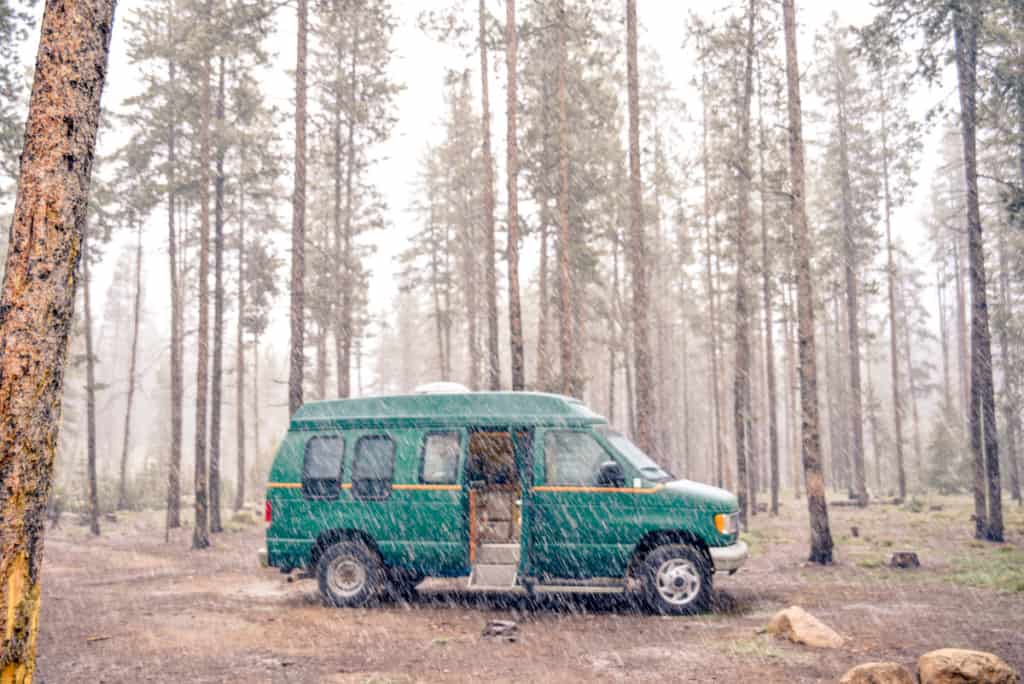
Year-Round Campsites
There are year-round campsites, and they can be found through lots of overlanding apps, including The Dyrt.
Ski Resort Parking Lots
Some ski resorts offer overnight parking. Make sure before you park at a ski resort that they are friendly to overnight camping, and always follow all posted rules and signs to avoid interfering with the resort’s regular business.
Big Businesses & Chain Stores
The same old standbys (Walmart, Home Depot, Cracker Barrel) that allow RV parking in the summer also usually offer that convenience in the winter. Just make sure to call ahead to the particular branch you’re planning to stop at.
Check out my guide on What Stores Allow Overnight Parking
Small Businesses & Residences
If you’re patronizing a small business in a somewhat remote town, the business owner might be generous enough to let you park overnight in their lot. Just don’t abuse the privilege and always ask first. If they say no, be respectful.
Residential streets are usually okay to park on overnight—again, just make sure to obey all posted signs. Additionally, some people will allow you to park in their driveway or on their property. Apps like Vanly can help you find these kind souls.
Showers & Hygiene Tips

Install Your Water Tank Inside
Even if you have an indoor shower, it will become unusable if your water tank freezes. Installing your tank and pipes on the hot side will also save you the hassle of frozen pipes and other water-related nightmares.
Use Gyms & Fitness Centers
Vanlife showering is a…creative process at the best of times. And be honest: you probably aren’t itching to get out in the snow and use your exterior shower during the winter. It’s okay: none of us are.
Stick to gyms, pools, RV parks and other facilities where you can pay a small fee to get access to their facilities. Sometimes, places like this will also have things like hot tubs and saunas which are a welcome relief for cold, road-weary bones.
I also recommend using a travel bidet filled with warm water for a pleasant tush cleaning! Not only will it feel nice, but you can save space in your portable toilet, and thus make less wintertime runs into the cold, if you opt to use a travel bidet and not bunches of toilet paper and/or wet wipes. It’s also more sanitary and eco-friendly (and less expensive) than daily TP use.
Winter Van Life Essentials
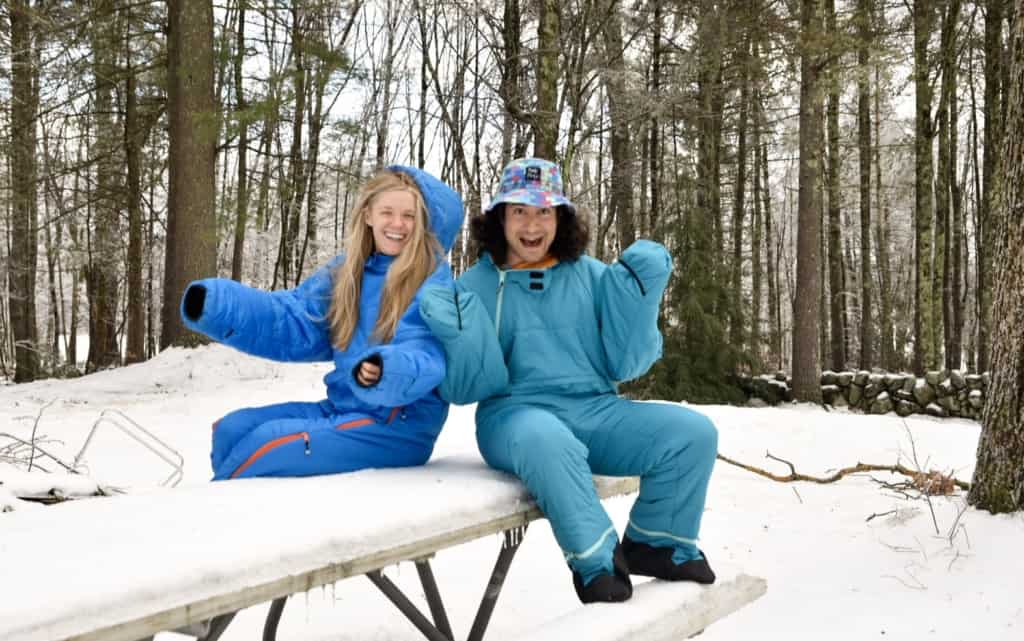
I can’t speak for all vanlifers, but these are the van life essentials that got me through cold winter days and nights.
- Wearable sleeping bag
- Teapot (for all the tea and cocoa)
- Microlite Javapress (keeps my coffee hot for up to two hours)
- Tire traction device
- Folding survival shovel
- Extendable foam snow brush / ice scraper
- Insulated slippers with durable sole
- Merino wool long socks
Are You Ready to Live in a Van in the Winter?
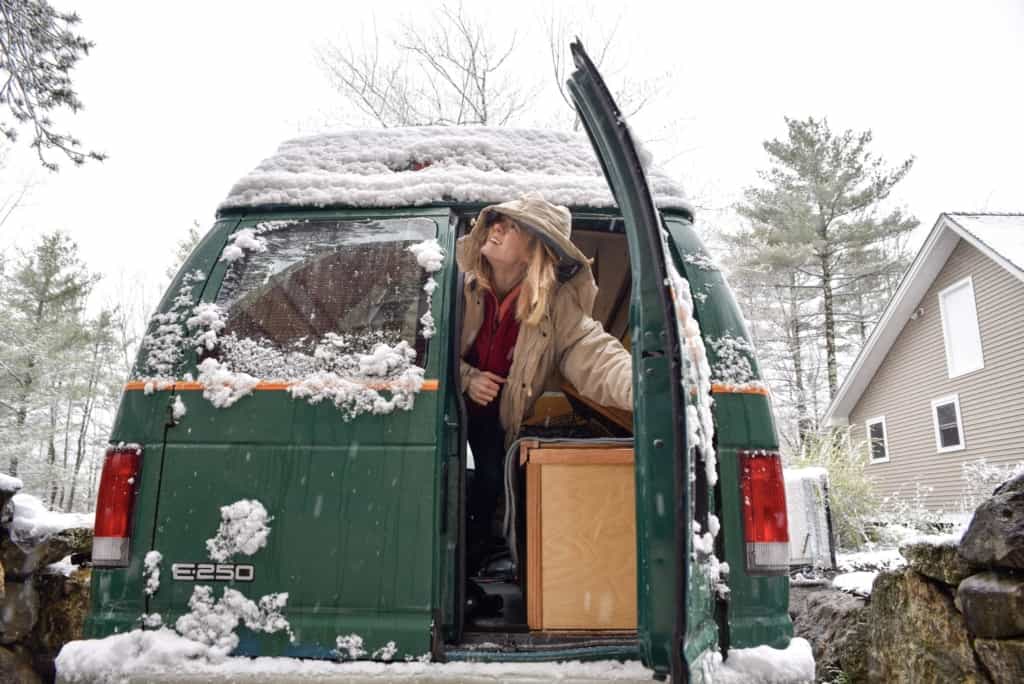
Winter van life is no joke! It’s not something that should be approached lightly, but with some careful planning and foresight, living in a van in the winter can be as magical and rewarding as summertime vantime (if not moreso!)
_______________________
Transparency note: please keep in mind that some links in my articles may be affiliate links, to which I may make a small commission at no extra to you, should you book travel or buy a product or service through one of these links. I only recommend products or services created by brands I know and trust.

